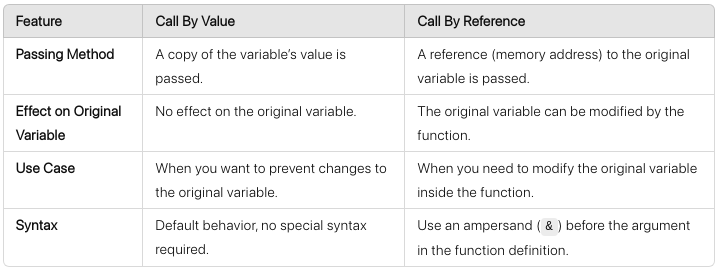When working with functions in PHP, how data is passed between functions and variables can significantly impact how your code behaves. PHP offers two primary ways of passing arguments to functions: Call by Value and Call by Reference. Understanding the difference between these two concepts is essential for writing efficient, bug-free PHP code.
In this blog, we will explore Call by Value and Call by Reference in PHP, explain their differences with examples, and provide insights into when to use each approach.
What Is Call By Value?
Call by Value is the default method in PHP when passing arguments to a function. In this method, a copy of the variable’s value is passed to the function. This means any changes made to the argument inside the function do not affect the original variable outside the function.
Let's take a look at a simple example:
<?php
function incrementValue($num) {
$num += 10;
echo "Inside function: $num\n"; // Output will be 20
}
$number = 10;
incrementValue($number);
echo "Outside function: $number\n"; // Output will be 10
Explanation:
- The variable
$numberholds the value10. - When
incrementValue($number)is called, PHP passes a copy of$numberto the function. - Inside the function, the local copy is incremented by
10, but the original$numberremains unchanged outside the function.
As a result, the output will be:
Inside function: 20
Outside function: 10
In Call by Value, since only a copy is passed, the original value is untouched by the function. This is useful when you don’t want to modify the original data but still need to perform operations on a copy within a function.
What Is Call By Reference?
Call by Reference allows a function to modify the original variable by passing a reference to it, rather than a copy. When passing by reference, PHP passes the memory address of the original variable, meaning changes made inside the function will affect the original variable.
In PHP, to use Call by Reference, you prepend the function parameter with an ampersand (&).
Here's an example illustrating how Call by Reference works:
<?php
function incrementValueByReference(&$num) {
$num += 10;
echo "Inside function: $num\n"; // Output will be 20
}
$number = 10;
incrementValueByReference($number);
echo "Outside function: $number\n"; // Output will be 20
Explanation:
- The variable
$numberinitially holds the value10. - When
incrementValueByReference(&$number)is called, PHP passes a reference to$number(not a copy). - Inside the function, the original
$numberis incremented by10. - The change is reflected in the original
$numberbecause the function is operating on a reference to the variable, not a separate copy.
As a result, the output will be:
Inside function: 20
Outside function: 20
This is how Call by Reference allows you to modify the original data directly within a function.
Key Differences Between Call By Value and Call By Reference

When to Use Call By Value
Data Safety:
When you want to ensure that the original value remains unchanged no matter what happens inside the function, Call by Value is the best approach. This is particularly useful in situations where the function is performing read-only operations, calculations, or formatting without modifying the data.
Preventing Side Effects:
Since Call by Value works on a copy of the variable, there are no side effects. You don't have to worry about accidental modifications to the original data outside the function scope.
Example Use Case:
<?php
function calculateDiscount($price) {
$price *= 0.9; // Apply a 10% discount
return $price;
}
$originalPrice = 100;
$discountedPrice = calculateDiscount($originalPrice);
echo "Original Price: $originalPrice\n"; // Outputs: 100
echo "Discounted Price: $discountedPrice\n"; // Outputs: 90
Here, Call by Value ensures that the original price remains intact while allowing the function to return a discounted value.
When to Use Call By Reference
Memory Efficiency:
If you’re working with large data structures, such as arrays or objects, copying large amounts of data can be memory-intensive. Call by Reference allows you to avoid unnecessary copying, which improves memory efficiency.
Modifying Input Data:
If your function is designed to modify the input data, such as updating user information or processing form data, Call by Reference is the appropriate approach.
Example Use Case:
<?php
function updateProfile(&$profile) {
$profile['age'] += 1; // Increment age by 1
}
$userProfile = ['name' => 'John', 'age' => 25];
updateProfile($userProfile);
echo "Updated Age: {$userProfile['age']}\n"; // Outputs: 26
Here, Call by Reference allows the function to modify the $userProfile array directly, incrementing the user's age.
Combining Call By Value and Call By Reference
You can also combine Call by Value and Call by Reference in the same function. For example, some arguments can be passed by value (e.g., fixed data or constants), while others can be passed by reference (e.g., data that needs to be updated).
Example:
<?php
function updateOrderTotal($price, &$total) {
$total += $price;
}
$orderTotal = 0;
updateOrderTotal(50, $orderTotal);
updateOrderTotal(30, $orderTotal);
echo "Final Order Total: $orderTotal\n"; // Outputs: 80
In this example:
- The price is passed by value, as it doesn't need to be modified.
- The total is passed by reference, so the function can update the running total for the order.
Best Practices for Using Call By Value and Call By Reference
Use Call By Value By Default
Since Call by Value is the default behavior in PHP, it’s typically a safer and more predictable option. Use Call by Value unless you specifically need to modify the original variable.
Use Call By Reference for Efficiency
For large data structures, such as arrays or objects, use Call by Reference to avoid the overhead of copying large amounts of data. This can significantly improve the performance of your application, especially when dealing with big datasets or complex objects.
Avoid Overusing Call By Reference
While Call by Reference can be efficient, overusing it can make your code harder to debug and maintain. If you pass variables by reference too frequently, it becomes difficult to track where changes to variables are being made. Use references only when necessary.
Clearly Document Functions That Modify Input
When using Call by Reference, clearly document which variables are passed by reference and why. This helps other developers (or future you) understand how the function works and what it modifies.
Conclusion
Understanding the difference between Call by Value and Call by Reference in PHP is crucial for writing efficient, maintainable code.
- Call by Value: Safeguards your data by working on copies, preventing unintended modifications.
- Call by Reference: Offers flexibility and performance advantages when you need to modify original data or work with large datasets.
Choosing the right method depends on your specific use case. In general, use Call by Value when data integrity is critical, and use Call by Reference when you need to modify the input directly or optimize memory usage. By mastering these concepts, you’ll be better equipped to write robust, efficient PHP code.
